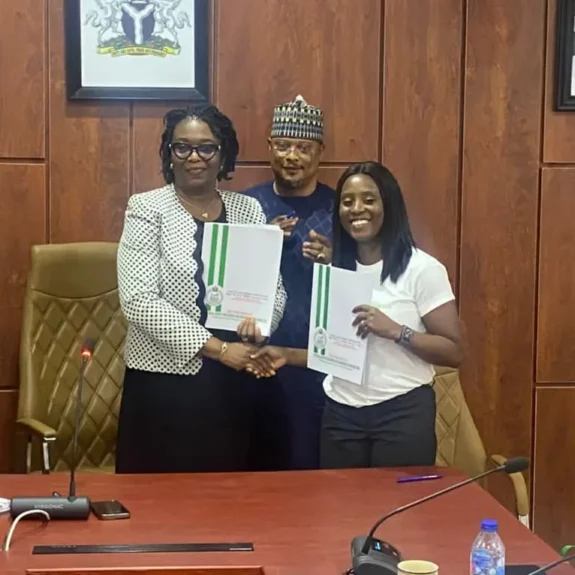
The National Agency for Science and Engineering Infrastructure (NASENI) has signed a partnership deal with Alon Green Recycling, which will focus on the design, fabrication and production of plastic recycling machinery and equipment. The 5 year Memorandum of Understanding (MOU) pact sealed on Wednesday April 26 in Abuja signals a new positive approach to the business of waste management and recycling in the country.
According to agency reports, one of the major challenges plaguing the local recycling and plastic waste management sector in Nigeria is the poor quality of locally fabricated recycling equipment and the high cost of imported ones. Other challenges according to the report is the low awareness and sensitisation drive on waste management practices, that include lack of proper household collection, segregation and source sorting which does not create any incentives for individuals, homes and businesses to recycle.
Speaking at the signing, Acting Executive Vice Chairman, NASENI, Mrs Nonyem Onyechi reiterated the need for recyclers in the country to operate with durable functional equipment that would ensure efficient recycling and a cleaner environment.
“This partnership between NASENI and Alon Green is of significant importance to the local recycling sector because it provides a local solution to a local challenge. The collaboration has the potential to make recycling more economically viable for Nigerian SMEs by providing good quality equipment locally and cutting out the need to import recycling equipment,” she said.
She also noted that NASENI’s mandate, among others, include to establish and nurture an appropriate and dynamic Science and Engineering infrastructure base for achieving home-initiated and home-sustained industrialization through the development of relevant processes, capital goods, and equipment necessary for job creation, for national economic wellbeing and progress.
“Scientific Equipment Development Institute Enugu (SEDI-E) is one of the Engineering Institutes under the supervision and control of NASENI with mandate in the area of development and production of Scientific Equipment and their production systems and the transfer of same to the private sector, satellite industries/SMEs for mass production and commercialization.
Also speaking, founder and CEO, Alon Green Recycling, Mrs Dolapo Olusanmokun said the collaboration with the government agency would go a long way to set things right in the recycling sector of the economy. “Alon Green is an innovative social impact plastic waste management and recycling company in Lagos. We will be working alongside SEDI-Enugu to pilot test the equipment and provide operational feedback to SEDI for improvement/enhancements. Alon Green will make available all the expected technical parameters for the equipment and also showcase and market the fabricated equipment to other recycling companies and sector stakeholders,” she said.
Meanwhile, research shows that Nigeria ranks 9th globally, among countries with the highest contribution to plastic pollution, with about 2.5 million tons of plastic waste generated annually. However, only 12 percent is recycled and the remaining 88 percent ends up in landfills, water bodies, drainages and streets leading to floods and other environmental hazards.
Nigeria’s population is projected to grow from its current 200 million to about 273 million in a few years time. This growing population is expected to trigger concerns in areas of population flows, food security, resource and wealth distribution, insecurity and conflicts including environmental degradation. All of which have the capacity to impact the urban system. Circular thinking will be essential to avoid an ever-worsening impact of this growth.
MSMEs make up the supply chain that feed companies that recycle PET into granules, flakes and pellets; and they sell to larger companies who further process into PET resins. The PET resins are used by FMCG, food & beverage, pharmaceutical, bottles and packaging companies.
Currently, most SMEs making significant strides in the sector have to import a lot of basic equipment like Baling machines, Crushers and naturally more complex ones like pelletizers and fully integrated wash lines. If MSMEs are to viably play in the recycling sector, they must be able to source affordable recycling equipment/machinery that is suited for the local environment.
For Nigeria to move forward, a more formal circular ecosystem needs to emerge. The Nigerian public and private sector are increasingly aware of the concept of circularity in the economy, and there are more projects and companies involved to come up with solution.
